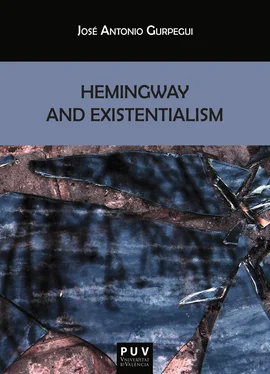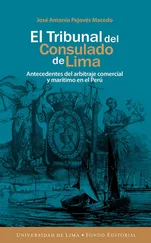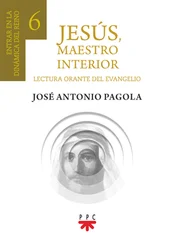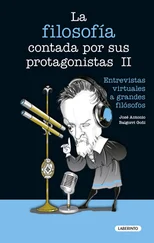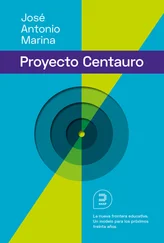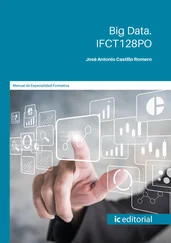HEMINGWAY
AND EXISTENTIALISM
Biblioteca Javier Coy d’estudis nord-americans
http://www.uv.es/bibjcoy
Directora
Carme Manuel
HEMINGWAY
AND EXISTENTIALISM
José Antonio Gurpegui
Biblioteca Javier Coy d’estudis nord-americans
Universitat de València
Hemingway and Existentialism
José Antonio Gurpegui
1ª edición de 2013
Reservados todos los derechos
Prohibida su reproducción total o parcial
ISBN: 978-84-9134-153-6
Imagen de la portada: Sophia de Vera Höltz
Diseño de la cubierta: Celso Hernández de la Figuera
Publicacions de la Universitat de València
http://puv.uv.es
publicacions@uv.es
Table of Contents
Introduction
Hemingway in the light of Kierkegaard
The Sun Also Rises : the exaltation of mankind
Conclusions
Bibliography
Introduction
Karl Jaspers states that in Kierkegaard there is something “different” that disturbs us once we have started to understand him (1980: 72). The same appreciation could be said with respect to Hemingway. The American Nobel’s popularity has motivated, to a great extent, the vulgarization, in every sense, of the impressive artistic legacy which he left behind, and has identified him as the drunken fun loving womanizer who put an end to his life by committing suicide. As Federico Eguíluz states, regarding the criticism arising after the writer received the Nobel Prize,
Uno sospecha, de todas formas, que estos ataques podían ir dirigidos más al hombre que a su obra, porque Hemingway no había tenido nunca demasiado tiempo para dedicarse a los círculos literarios, y nunca dudó en expresarlo así con un lenguaje claro y agresivo. (45) 1
The reading of his literary corpus awakens innumerable questions: why the obsession with death? Why the persistence of introducing a nihilistic existence? Why the moral principles so far from ethics? Why the continuous, repetitive heroprotagonist structured over and over following identical parameters, to the point of coining the term “code hero” when speaking of his characters? Why does he place them in extreme situations in a desperate attempt to obtain the “grace under pressure”—as it has also been coined? Why his apparent misogynous attitude? Why do his novels take place outside his native North America?
The questions become even more worrisome when we consider his famous iceberg theory in which a narration must only show one eighth of what can be found in the surface. One searches for answers when reading the abundant criticism about Hemingway and realizes that a good part of it barely gives light into some of the already mentioned questions making us “suspect,” using Eguíluz’s terminology, that most of it has been based on the visible part of the iceberg not showing what is hidden. The basis of this work is to “go into depth”—as Heidegger would say—with the objective of finding a coherent principle as universal as possible to obtain satisfactory answers to the questions posed. That principle, as I will try to prove, is found in existentialist philosophy. The reading of Kierkegaard and mainly Heidegger, but also Jaspers and Sartre, will give us another way of interpreting, another path to “understand” the human worries that distressed Hemingway. They offer us a dialectic, I even dare to affirm a “methodology” or exegesis, by which we can project in his novels and in most of his short stories an interpretative model that helps us understand while harmonizing the “apparent” incongruence that some have found in them. The theory here defended is that existentialist philosophy may help to understand the conception that Hemingway had of the individual as a human being as well as his relationship with the world. After all, as Heidegger states in Ontology: The Hermeneutic of Facticity , “All interpreting is an interpreting with respect to something, on the basis of it and with view to it. The fore having which is to be interpretively explicated must be put into the context of the object and seen there. One must step away from the subject matter initially given and back to that on which it is based” (60).
Searching for Literary Independence
Throughout his life, Hemingway antagonized many people, in many cases artistic figures with whom he had kept a close friendship. Francis Scott Fitzgerald, Ford Madox Ford, Gertrude Stein, and John Dos Passos, 2 who had been part of his closest circle of friends, were some of the writers who suffered his humiliations and embarrassing writings. However, it is also true that Hemingway suffered his share of attacks. Brassaï, in his essay about Henry Miller, states that, among the modern writers, Hemingway was “his black beast,” and quotes a passage of Miller’s correspondence after Hemingway’s death, “Céline’s death touched me more than Hemingway’s. The latter’s work never attracted me neither as a writer nor as a man. It was all just a legend created around his name” (173).
Among all the disputes, one of the most peculiar and surprising is the one with Sherwood Anderson. The only feeling that Hemingway could have towards Anderson was that of gratitude. Anderson was the one who encouraged him to travel to Europe when Hemingway’s future as a reporter seemed somewhat unsubstantial; it was also the author of Winesburg, Ohio the one who wrote letters of recommendation to Gertrude Stein opening doors to the “crème de la crème” of the Parisian intellectuality; he also influenced in a determinant way—together with Francis Scott Fitzgerald—for Boni & Liveright publishing company to publish the American version of In Our Time , even though Hemingway was not a known author; and last but not less important, his influence in Hemingway’s artistic beginnings was decisive, to the point that Gertrude Stein would state that the main debt of Hemingway’s style was due to herself and Sherwood Anderson.
We can ask ourselves about the origin of the furious satire against Anderson represented in The Torrents of Spring . It could be argued that this is only the first attack on a writer, something present throughout Hemingway’s writings. He also parodied Harold Loeb in The Sun Also Rises ; Scott Fitzgerald in the first version of “The Snows of Kilimanjaro”; Dos Passos in To Have and Have Not ; Sinclair Lewis in Across the River and Into the Trees ; and Stein and Ford in A Moveable Feast . Nevertheless, Anderson’s case is peculiar. 3
To begin, we must say that the “fight” was not personal as it happened with the rest of the writers. The contact between Anderson, who was in the United States, and Hemingway, who was living in Europe while developing and writing the novel, was nonexistent. Even the constant correspondence of the early days had ceased. There are no existing references concerning any types of professional, sentimental or economical problems that could be pending between them. Therefore, it seems appropriate to focus the analysis purely on the artistic field. In Dark Laughte r (1925), the cause of the dispute, Anderson advocated and praised the purity of the Black and Indian primitivism against modern society’s technology. That was the touchstone that irritated Hemingway. It is significant that Hemingway entitled his first publication in our time —the lower case corresponds to the fashion of those times, motivated by e.e.cummings and followed by Ford Madox Ford, editor of the “transatlantic review,” tending to eliminate the capital letters. This in itself seems to indicate a wish to break away, a formal distancing if so, from the past. Aside from the purely formal aspects, the title is interesting in itself, “ in our time ”; what does Hemingway mean when he makes a deliberate reference to “our time?” If, as is the case, it is not about the heading of any of the stories, what does he want to manifest with this title? Does he pretend to suggest that “his” time is different from the prior one? If so, in what sense?
Читать дальше
